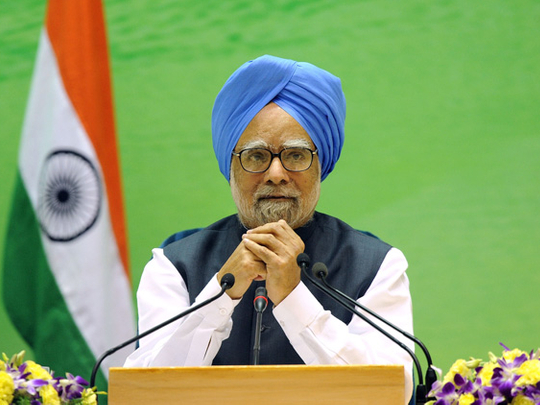
Two chapatis (Indian bread) and a dollop of dal (lentils) is said to constitute lunch for Manmohan Singh, the prime minister of India. The gentle, brainy fellow, at 78, remains alert and industrious. He is considered honest and frugal, rare virtues in a country with eye-popping graft.
Yet Singh could do with a new-year menu of meatier fare. He has been passive in the face of recent setbacks. Corruption scandals forced out two of his ministers, with a third redeployed.
The opposition Bharatiya Janata Party (BJP), demanding a public inquiry on graft, blocked Parliament throughout the winter session and may do so again in spring.
The Supreme Court has chided Singh for dragging his feet over a scam at the telecom ministry costing probably billions of dollars. And on January 17, prominent types decried in a public letter a "widespread governance deficit". A cabinet minister says all this hurts.
Singh's main response has been a shrug and a twinkly smile. He won a second term in 2009 with the strongest mandate of any prime minister in the past 20 years. The opposition, at least until it rallied around the cause of corruption, has been unfocused.
Yet Singh's second government has offered no big policy reforms, while letting public support ebb away as voters grumble about graft and inflation. On January 19, a modest cabinet reshuffle took place. Singh has since promised a "more expansive exercise" after the budget next month.
Singh describes himself as an "accidental politician", and he will anyway be gone before the next election, probably in 2014. It is more baffling that Sonia Gandhi, the real power behind the Congress party, which dominates the government coalition, does little to stop the drift, especially given Congress's recent electoral setbacks in important states, notably Bihar.
Gandhi's son, Rahul, is the most likely choice as the next prime minister, though he did not take a government job in last week's reshuffle. His efforts to get young, rural voters to turn out for Congress have been disappointing.
While touring Uttar Pradesh this month, Gandhi's car was battered by angry youths. His recent attempt to blame government woes on coalition politics looked limp: Singh's government is unusually secure in Parliament.
Congress has time to fix its problems. And despite the drift, some ministers, notably the environment minister, Jairam Ramesh, have an eye for the popular gesture. This week he ordered a scandal-tainted apartment block in Mumbai to be razed. Meanwhile, the Supreme Court is pushing against corruption. On January 19, it asked the government to release more details on how rich Indians stash money abroad to evade taxes.
The most pressing task is to ensure a healthy economy. Though economic growth, at an annualised rate of 9 per cent, remains robust, foreign investment has fallen and growth in industrial output has slowed.
Anger on the street
Now inflation is surging. Fuel prices are higher after the government boldly scrapped subsidies on petrol and diesel. Food inflation, at 17 per cent, is even more painful and may now bring protesters into the streets. Poorer Indians are furious at stinging prices for onions and pulses such as the lentils favoured by Singh.
The government has few options to deal with this quickly. Dearer food in India is mainly a reflection of rising commodity prices around the world. But the government could tackle home-grown difficulties that strangle supply in all sorts of industries, including agriculture, retailing, infrastructure and logistics.
Allowing in more foreign investors would help keep the economy charging on. Yet the liberal Singh, once the architect of Indian reforms, appears not so bold as he was.









